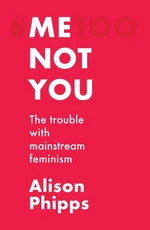The Me Too movement, started by Black feminist Tarana Burke in 2006, went viral as a hashtag eleven years later after a tweet by white actor Alyssa Milano. Mainstream movements like #MeToo have often built on and co-opted the work of women of colour, while refusing to learn from them or centre their concerns. Far too often, the message is not âMe, Tooâ but âMe, Not Youâ. Alison Phipps argues that this is not just a lack of solidarity. Privileged white women also sacrifice more marginalised people to achieve their aims, or even define them as enemies when they get in the way.Me, not you argues that the mainstream movement against sexual violence expresses a political whiteness that both reflects its demographics and limits its revolutionary potential. Privileged white women use their traumatic experiences to create media outrage, while relying on state power and bureaucracy to purge âbad menâ from elite institutions with little concern for where they might appear next. In their attacks on sex workers and trans people, the more reactionary branches of this feminist movement play into the hands of the resurgent far-right.
Price history
▲7.61%
Jan 27, 2022
€18.40
▼-0.84%
Jan 24, 2022
€17.10
▲0.57%
Jan 17, 2022
€17.24
▲0.06%
Jan 11, 2022
€17.15
▲0.51%
Jan 10, 2022
€17.14
▲0.92%
Jan 4, 2022
€17.05
▲1.22%
Dec 28, 2021
€16.89
▼-0.17%
Dec 21, 2021
€16.69
▼-0.12%
Dec 14, 2021
€16.72
▲0.29%
Dec 13, 2021
€16.74

